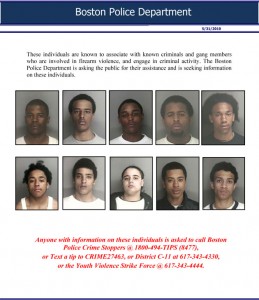Published June 2, 2010
When I posted the Boston Police Department’s unorthodox flier yesterday, I wondered: What exactly does the BPD want here? What am I supposed to do if I see one of these guys?
After the brazen murder of 14-year-old Nicholas Fomby-Davis in Dorchester this weekend, police distributed what appear to be mug shots of people “known to associate with known criminals and gang members who are involved in firearm violence, and engage in criminal activity.”
Nathaniel Davis Jr., the boy’s father, told WBUR’s Bianca Vazquez Toness (in a must-listen story) he saw some of these men walk into a local drug store, so he followed what he thought were instructions to call police.
“They said they’re not really looking for them, they’re just letting people know that these are known criminals,” Davis said. “What’s the sense in putting it out there if they ain’t going to do nothing, you know?”
It’s important to say that the men in the flier are not accused of a crime. They are not “wanted criminals,” a la the FBI’s 10 Most Wanted poster. They’re just people we’re supposed to, you know, be aware of.
Police say they want to keep gangbangers off the streets. Some gang members see their mug on a police flier as a badge of honor.
But at least one of the men pictured tells Bianca he’s no gang member, that his name is being tarnished by the police.
It raises legal questions. Can the government publicly declare these people — who are not sought by law enforcement or accused of a crime — “bad guys?” Isn’t that defamation?
After Nicholas died, it was shock and then outrage in Boston. And rightly so. Mayor Thomas Menino said gangbangers should be treated like “Taliban.” But civil liberties, even for gangbangers, are no less important in a crisis.
Any legal minds want to weigh in?
